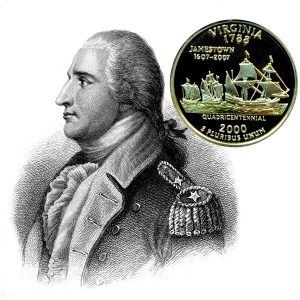Today, the Virginia State Quarter Coin remembers when Benedict Arnold, once a continental soldier then as a British general, ransacked Osborne’s, Virginia 236 years ago.
From Battles of the United States, By Sea and Land by Henry Barton Dawson, published in 1858:
=====
April 27, 1781.
The Action at Osborne’s, Virginia.
The American troops having been driven from Petersburg, and the tobacco, which had been stored there, having been destroyed, on the twenty seventh of April, the enemy left the scene of their wantonness, in search of fresh supplies.
General Phillips, with the light-infantry, and part of the Yagers, and of the cavalry of the Queen’s Rangers, marched to Chesterfield Courthouse, where he destroyed a range of barracks which would accommodate two thousand men, three hundred barrels of flour, and other stores.
And, at the same time, General Arnold moved to Osborne’s, a small village on the south side of the James River, about fifteen miles below Richmond, with the Seventy-sixth and Eightieth regiments, part of the Yagers and of the Queen’s Rangers, and the American Legion.
Osborne’s, the scene of General Arnold’s exploits, was the rendezvous of the small naval force which had been collected with the intention of co-operating with the French fleet in a projected attempt against Portsmouth, and it appears somewhat singular that it should have been allowed to remain in so exposed a situation while the enemy remained within striking distance.
With the great shrewdness which General Arnold was wont to display, the movement was a secret one, care having been taken that no information of the approach of the enemy should reach the Americans, and he came into their immediate vicinity before his presence was known.
Before he opened his fire, however, he summoned the commander to surrender, “offering one half the contents of their cargoes in case they did not destroy any part.”
With a degree of resolution and of patriotic virtue, which should have made the traitor blush, the nameless commander sent word, in answer, “We are determined and ready to defend our ships, and will sink them rather than surrender.”
On the receipt of this reply, General Arnold ordered two three-pounders, under Lieutenant Rogers, to open a fire on the stern of the Tempest, a State ship, mounting twenty guns; while Captain Fage, with two six-pounders, “opened from an unexpected quarter, with great effect.”
At the same time Lieutenant Spencer was ordered to lead a party of Yagers, “by a route partly covered with ditches, within thirty yards of her stern,” in order that all who showed themselves on deck might be picked off.
A brisk fire was immediately opened by the Tempest, the Renown, of twenty six guns, the Jefferson, of fourteen guns, and some smaller vessels, as well as by a body of militia, who occupied the northern bank of the river; but, when the greatly superior force of the enemy is considered, the contest was too unequal to be either long-continued or successful to the Americans.
A shot from one of the enemy’s pieces having cut the cable of the Tempest, she sheered around, and exposed herself to a raking fire from Lieutenant Rogers’ three pounders, when the crew, taking to the boats, attempted to escape.
As the enemy had no boats, and the wind was blowing quite hard, he could not take advantage of the panic into which the entire squadron appears to have fallen.
Yet two ships, three brigs, two schooners, and five sloops, all laden with tobacco, flour, cordage, &c., were taken, and four ships, five brigs, and several smaller vessels, similarly laden, were burned or sunk.
Upwards of two thousand hogsheads of tobacco, besides other stores, were destroyed, without any loss to the enemy, and if any loss, except that of the property, was sustained by the Virginians, it has not been recorded.
The result of these predatory expeditions was a terrible blow to Virginia,— her tobacco being her circulating medium,—and, indirectly, to the cause of America; yet, strange to say, not a single man moved from the Northern or Eastern States to render any assistance, or to ward off a single blow which was aimed at her existence.
Well might her people “touch largely on the conduct of their Eastern friends, in the day of peril, compared with their conduct to the latter in their day of trial.”
=====
The Virginia State Quarter Coin shows with an artist’s image of Benedict Arnold.
